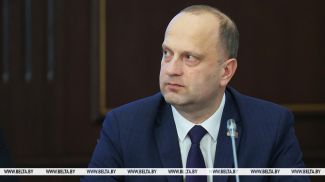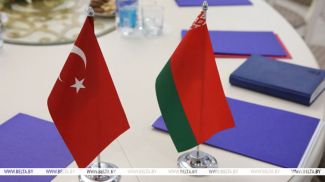MINSK, 30 December (BelTA) – Belarusian Economy Minister Aleksandr Chervyakov made a report in the Minsk City Hall to outline the economic targets for 2022, BelTA learned from the press service of the Economy Ministry.
The decree on the most important parameters of the country's development in 2022 that the head of state signed in early December covers the qualitative components of GDP: export, investment, revenue. Therefore, Aleksandr Chervyakov outlined the algorithm for achieving them through the prism of regional tasks. The ultimate goal is to reduce the gap in the level and quality of life among regions.
"The task of reducing interregional differentiation is closely related to stimulating the inflow of investments. In 2022, the investment is projected to exceed Br36 billion. Minsk is expected to attract Br5.9 billion, which is up 3% year-on-year. The state investment program provides for the significant amount of funds for projects in Minsk next year. The city must place the main emphasis on the projects in the manufacturing industry, which ultimately provide revenues to the budget. In Minsk, these are 91 projects with the volume of investments at Br6.9 billion during the five-year period. More than Br1.9 billion must be utilized in 2022," Aleksandr Chervyakov noted.
Speaking about the next task, which is household income growth, the economy minister noted that the regions were instructed to increase the nominal wage. “The growth in nominal wage should outpace inflation but not exceed labor productivity. Wages must be earned,” Aleksandr Chervyakov stressed.
Naturally, income growth directly depends on performance. According to the minister, Minsk has reported some positive trends: the profitability of sales here is higher than the country's average, the share of loss-making companies and overdue debts is among the lowest, the debt burden is also below the country's average.
Speaking about loss-making companies, Aleksandr Chervyakov noted: “Let me remind you that the head of state instructed the government, regional executive committees and the Minsk City Council to make every effort to prevent public sector organization from operating in the red.”
According to the minister, import substitution is an important reserve to increase efficiency.
The next task is to grow exports, secure a foothold on traditional markets and tap into promising markets. “The export is supposed to grow by more than 6%, or $3 billion. Export promotion measures have been outlined,” the minister said.
Aleksandr Chervyakov emphasized another performance indicator important for regional leaders - growing revenues of local budgets. “This will require improvements to business environment. The appropriate measures simplify the regulatory framework for small business. More than 160 administrative procedures will be transferred into electronic form. Their total number as well as the time of administrative decision-making process will be reduced by 25%. Financing channels will be expanded for small and medium enterprises to include guarantee fund, venture financing, introduction of a crowdfunding institute,” the minister explained.
The Belarusian economy minister stressed the importance of fulfilling the digitalization task by all the regions. “Digitalization is the basis for productivity growth in all sectors of the economy. For example, let's take construction industry. The Economy Ministry will put forward an initiative to use BIM-technologies, which create ‘digital twins' for the construction projects with budget financing. We are not pioneers here. The Russian Federation has been using this approach for several years already. The approach makes it possible to keep costs down, improve quality of work, and reduce construction cycle,” Aleksandr Chervyakov said.













